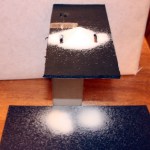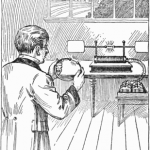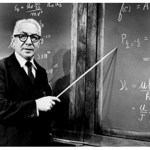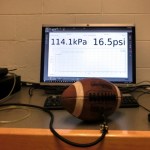Science
No, not the little cover .jpg that I use as the "featured image" to tag these posts promoting Eureka. The post title refers to the Big Picture Science radio show from the SETI insitute. I'm one of the people interviewed in the latest episode, Maria Konnikova (author of Mastermind) and Louis Liebenberg.
This is another interview that was recorded remotely down at WAMC in Albany. They pushed back on my stock answers a little more than usual, which in one sense was fun, but was also pretty exhausting, as I was at the lowest point of the cold I'm just getting over now. I went home right after it…
I've done yet another piece for The Conversation, this one expanding on something I've been saying in interviews promoting Eureka: that knowing the process of science can help people sort good science from bad. In this particular case, I take the somewhat #slatepitch-y angle that the recent high-profile unraveling of the BICEP2 experiment's claim to detect primordial gravitational waves is a good thing:
Along with general disappointment, the new announcement has prompted discussion of what, if anything, the BICEP2 team did wrong. Many commentators fault them for over-hyping their results to…
This was a good week for "Chad bristles at side issues of massively reshared stories," with the Vox and gender bias stories, and also this PBS piece urging parents to tell their kids science stories. That probably seems surprising, given what I do around here, but while I fully endorse the end of that piece, the opening section in which Wendy Thomas Russell explains why she never liked science mostly makes me think that she's an awful person. She attributes her lack of interest in science to bad teaching, and provides a series of examples ending with:
Later, at the University of Nebraska, I…
I've seen a lot of reshares of this report about the long-term effect of gender bias in elementary math, which comes from an NBER working paper about a study of Israeli schools. The usual presentation highlights one specific result, namely that on a math test graded by teachers who knew the names of the students, boys outscored girls, but a blinded test saw girls outscore boys.
This sounds pretty damning, but also kind of puzzling-- is there really that much room for partial credit in elementary school math? Looking at the actual paper (which you can get emailed to you if you have a .edu…
Well, the ongoing multistate measles outbreak that's been in the news for the last few weeks continues apace, which means I can't seem to stay away from the issue for more than a couple of days. For instance, yesterday I learned that five babies at a Chicago-area day care have been diagnosed with the measles. All the babies are under a year old and therefore too young to have received the MMR vaccine yet. At this point, I'm betting that most likely the baby who brought the measles to the KinderCare Day Care with this measles outbreak got it from an older unvaccinated sibling, but time will…
(When I launched the Advent Calendar of Science Stories series back in December, I had a few things in mind, but wasn’t sure I’d get through 24 days. In the end, I had more than enough material, and in fact didn’t end up using a few of my original ideas. So I’ll do a few additional posts, on an occasional basis, to use up a bit more of the leftover bits from Eureka: Discovering Your Inner Scientist…)
While we mostly think of science being done in comfortable institutes if not gleaming laboratories, one of the most impressive and inspiring things about science is that people can and do carry…
Image Via NASA
In our recent STEM in the News blog, X-STEM Festival Speaker and Director of the National Institute of Allergy and Infectious Diseases (NIAID), Dr. Anthony Fauci discusses the importance of childhood vaccinations and his frustration with the recent Disneyland measles outbreak, Festival Nifty Fifty Speaker and Material Scientist Dr. Ainissa Ramirez breaks down the science of "Deflategate", NASA holds the first ever "State of NASA" event, find out what causes the smell of rain and learn about exciting STEM scholarships and fellowships. Click here to…
Probably the dumbest person I've ever met in my life was a housemate in grad school. I didn't do my lab work on campus, so I wasn't living in a neighborhood where cheap housing was rented to students, but in a place where folks were either genuinely poor, or in the market for very temporary lodgings while they looked for something better. There were low-income housing units across the street, and also an apartment building full of families who didn't quite qualify for welfare.
This particular guy rented one of the other rooms in the house, and worked a series of unskilled jobs-- assistant on…
It didn't make the news, because skittish media types are mostly based in New York City and thus don't care about anything north of Westchester County, but we had a big snow storm yesterday. It started snowing Sunday night, though, and kept up through pretty much dinnertime Monday. Both the local schools and the snow-day day-care program we signed the kids up for were shut down, with good reason- I had to go to campus for my 10:30 am class, and that two-mile drive was pretty nerve-wracking.
Since the kids were home for the day, we did a bit of playing outside, even though the temperatures…
Over at Scientific American's Frontiers for Young Minds blog, they have a great post on what happens when you ask scientists to explain key elements of a different research field. It's pretty funny, and rings very true, as SteelyKid asks me tons of science questions, very few of which have anything to do with atomic, molecular, or optical physics. so I spend a lot of time faking my way through really basic explanations of other fields.
Of course, even pitching stuff from my own field at the right level for small kids is a challenge. Which reminds me, I never did explain my presentation for…
Denialists claiming to be pro-science. Politicians insisting on a balanced treatment. A population ignorant of the science indignantly rejecting a clear and well-established, evidence-based conclusion.
I'm not talking about creationism, although it's exactly the same story. It's the anti-vax position now.
That dishonest weasel, Chris Christie, is now talking about respecting the choice of anti-vax parents.
Mary Pat and I have had our children vaccinated and we think that it’s an important part of being sure we protect their health and the public health, Christie told reporters here Monday.…
(When I launched the Advent Calendar of Science Stories series back in December, I had a few things in mind, but wasn't sure I'd get through 24 days. In the end, I had more than enough material, and in fact didn't end up using a few of my original ideas. So I'll do a few additional posts, on an occasional basis, to use up a bit more of the leftover bits from Eureka: Discovering Your Inner Scientist...)
One of the things I was reacting against in writing Eureka is the popular idea of scientists as a sort of unworldly elite, off doing their ivory-tower idealized thing without worrying about…
The ending of last night's Super Bowl couldn't've been more perfect as a demonstration of the point I was making about scientific thinking in football (and, you know, in that book I keep flogging...). First, on the positive side, you have New England's Malcolm Butler making the key play:
"I knew what was going to happen," said Butler, an undrafted free agent out of Western Alabama who said New England was the only team that gave him a chance to reach the NFL. "I don't know how I knew. I just knew. I just beat him to the point and caught the ball."
Perhaps Butler knew because he had seen the…
I wrote up another piece about football for the Conversation, this time drawing on material from Eureka, explaining how great football players are using scientific thinking:
Seattle Seahawks cornerback Richard Sherman gets called a lot of things. He calls himself the greatest cornerback in the NFL (and Seattle fans tend to agree). Sportswriters and some other players call him a loudmouth and a showboater. Fans of other teams call him a lot of things that shouldn’t see print (even on the internet). One thing you’re not likely to hear anyone on ESPN call Sherman, though, is “scientist.”
And…
Math with Bad Drawings has a post about "word problems" that will sound very familiar to anyone who's taught introductory physics. As he notes, the problem with "word problems" for math-phobic students is that it requires translating words into symbols, and then using the symbols to select a procedure. It adds a step to what at a lower level is a simple turn-the-crank algorithm: given this set of symbols, do these abstract operations, and write down the answers.
This is a very familiar problem in intro physics, where I regularly have struggling students tell me "I can do the math just fine, I…
Over at Curious Wavefunction, Ashutosh Jogalekar offers a list of great surprising results in physics. This is fairly comprehensive, but leaves out one of my favorites, which is the discovery of the muon. Muons are particles like electrons, but a couple hundred times heavier. When they were first detected in cosmic ray traces in 1936, physicists briefly thought they were the mesons that Hideki Yukawa had predicted as the carriers of the strong nuclear force. It quickly became clear, though, that while the mass was about right to be Yukawa's particle, the muon didn't have anything to do with…
I know I said I was done with this story, but this was actually recorded last week: The Daily Planet show on Discovery Channel in Canada contacted me last week when all this deflated-football silliness was exploding, and got a cameraman to come over and record me talking about it. The episode aired Monday night, January 26th, and you can stream it from their archives at the link above (I think it should be episode 216, but when I looked just now, it was just "Episode 16," but the date is correct. My bit is toward the end, starting around the 35:00 mark, but you should totally watch the whole…
The low-level cold I've been nursing for a month now finally exploded into the full unpleasantness of my usual winter illness Saturday, or else I would've been more active following up on my Deflategate article and my ideal gas law post. As it was, for most of the day, I could barely keep on top of clearing comments from moderation.
Anyway, a few things deserve more prominent responses than a comment at the end of a long post, so:
-- I was in bed during the great Bill Belichick press conference, though I saw some mockery of it come across Twitter. While it may not have played well with the…
Just yesterday, Japanese fishermen caught a 6m long giant squid, and it lived for a few hours before expiring. Here's a video of the rare beastie swimming about, with shots of the tragic corpse afterwards.
So, as mentioned yesterday, I got an email asking me about the weird scandal involving the Patriots and underinflated footballs, so I wrote a piece for the Conversation on the subject. since a few people had beaten me to citations of the Ideal Gas Law, though, I decided to bring my own particular set of skills into this, and did an experiment.
[UPDATE: I've added some follow-up/concluding remarks in a separate post from Sunday 1/25. So, if you care about my reaction to Belichick's big press conference, go over there.]
You can see the basic set-up at the link-- I got a couple of footballs from…








